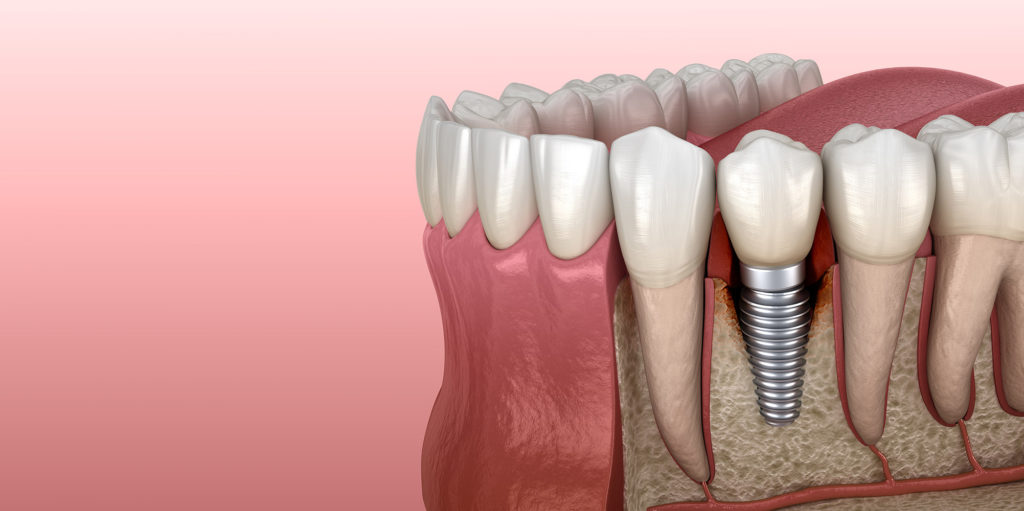
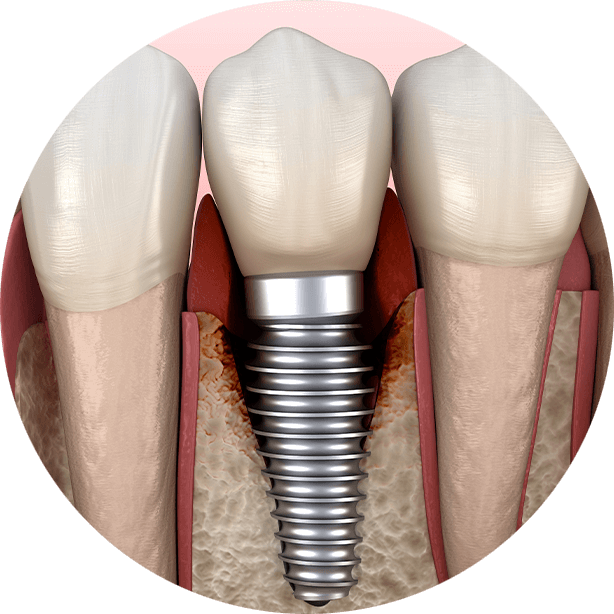
LAPIP™ SOLVES PERI-IMPLANTITIS
USING HIGH-TECH LASERS
If we discover that you have peri-implantitis, there is a comfortable, reliable procedure to address the situation. This procedure is known as LAPIP™ and uses the PerioLase® MVP-7™ dental laser to resolve the infection around your implant and stimulate the growth of new bone around the implant. After treatment, you can expect minimal irritation and inflammation thanks to the speed and gentle nature of the laser. The success rate of LAPIP™ to solve concerns around peri-implantitis is very high. Contact our office in Carbondale, IL, for more information about how we treat failing dental implants. Are you worried that there may be something wrong with your dental implants? Contact Oral & Maxilofacial Surgery of Carbondale to schedule a consultation.
LAPIP® and Peri-Implantitis Explained
The LAPIP protocol uses the PerioLase MVP-7 dental laser to treat peri-implantitis. During the procedure a thin optical fiber is inserted between your gums and dental implant. The laser energy from the fiber destroys the bacteria causing the infection without harming healthy bacteria. The laser energy stimulates your body’s natural stem cells to regenerate bone around the dental implant, without the need for foreign biologics.
LAPIP treatment can be done immediately after diagnosis. Because we don’t use a scalpel and don’t cut your gums, there is less pain, less gum recession and faster healing than other treatment methods.
Many patients who come to Oral & Maxillofacial Surgery of Carbondale for dental implants have lost their teeth to periodontal disease. However, periodontal disease can also affect dental implants much in the same way it does natural teeth. With peri-implantitis, bone loss accelerates faster than bone loss with periodontal disease, making early diagnosis even more critical to saving the dental implant. Otherwise, bone loss can cause the implant to fail, and the bacteria in the mouth may also pose serious danger to the rest of the body.
Peri-implantitis is an oral infection that affects the bone and soft tissue surrounding dental implants. It is an accumulation of oral bacteria that become trapped between the gum tissue and the implant and destroy the supporting bone structure. Otherwise, bone loss can cause the implant to fail, and the bacteria in the mouth may also pose serious danger to the rest of the body.
Medical research today shows us that oral bacteria can enter the bloodstream and result in systemic illness, even causing fatal diseases of the organs. Seeking early treatment just makes sense and can help protect your implant investment.
Using laser therapy we can treat patients with peri-implantitis much the same way he treats real teeth of patients with periodontal disease.
Laser gum disease treatment was originally developed for natural teeth to remove bacteria and stimulate bone growth with minimal pain and inflammation compared to traditional gum surgery. Now, the same laser, the PerioLase® MVP-7™, is providing therapeutic benefits and successful outcomes for patients with peri-implantitis.
LAPIP® in Carbondale, IL makes it possible to remove diseased tissue around a dental implant without causing any significant harm to the healthy tissue. It is gentle, reducing inflammation and discomfort while encouraging new bone growth to reinforce and save your implant.
You Need a Surgical Expert
If you’ve completed dental implant treatment and have swelling, pain, or infection around your implants, you need care from a surgical expert like our oral surgeon in Carbondale, IL. While dental implants are considered the preferred option for replacing teeth today, you can still experience complications and even failing dental implants. One of the biggest contributors to implant failure is under-engineering. If too few implants were placed or inserted in the wrong location or angle to support a prosthesis, or your bite wasn’t properly adjusted, this will cause an unequal distribution of pressure.
Any excessive force on an implant can result in prosthetic fracture, bone loss, infection, and eventual failure of the implant(s). You’ll need the expertise of a trained dental implant surgeon to assess your situation and remove the implant, if necessary. An implant expert like our oral surgeon will also have the level of skill and necessary technology to replace your dental implant—and do it right. If you’re noticing signs of ailing or failing dental implants in Carbondale, IL, don’t wait to get treatment from our team!
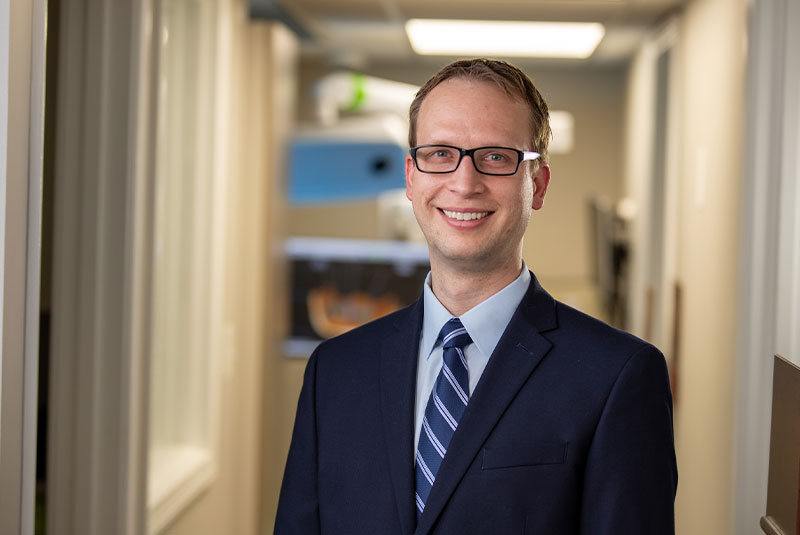
Causes of Dental Implant Complications
- Excessive stress on implant(s)
- Improper angle and location
- Unadjusted or misaligned bite
- Chronic teeth grinding
- Poor oral hygiene
- Dental trauma
- Systemic disease
A Solution for Failing Dental Implants
The most common solution for failing dental implants is a total replacement of the implant itself. We will determine this after an evaluation and x-rays. But in most cases where the implant(s) hasn’t responded to either nonsurgical or surgical intervention (peri-implantitis treatment and bone grafts), this is the best option for your health and function.
In general, there are two techniques for removing a failing dental implant from your bone. One is to cut a small portion of bone, sometimes with a piezo-electric device, around the implant edge so it can easily be removed. Another technique is to “reverse torque” the implant out of the bone. In all instances, our goal is to preserve as much of your natural bone as possible for more predictable and lasting implant success in the future.
LAPIP Laser Assisted Peri-Implantitis Procedure: Save Failing Dental Implants
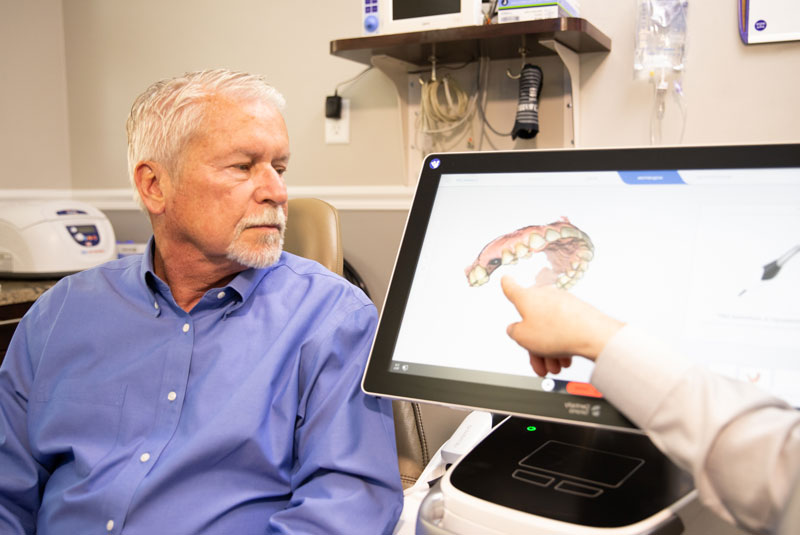
Expert Care after Dental Implant Failure
A failed dental implant doesn’t disqualify you from being a candidate for one in the future. It simply means it’s critical that you receive treatment from a qualified clinician with the skill to do it correctly. Our oral surgeon is part of the only dental specialty to achieve the highest level of education and training in surgery, including dental implants. We also use state-of-the-art surgical technology and materials scientifically proven to withstand the forces of biting and chewing.
Our oral surgeon offers fully guided implant surgery to remove virtually all room for error, with exact and consistent results. Working closely with your restorative dentist, we can deliver a personalized treatment and a new smile that provides long-term function and aesthetics. You can have a smile that lasts—and it begins with the expertise of our surgical team in Carbondale, IL!
Painful dental implants?
Don’t wait to schedule your consultation with us today.
I understand the information disclosed in this form may be subject to re-disclosure and may no longer be protected by HIPAA privacy regulations and the HITECH Act.
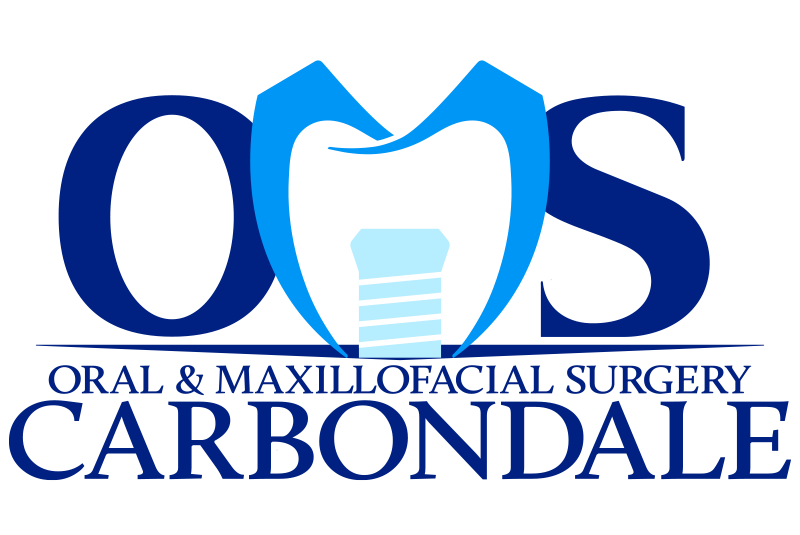
1111 E. Walnut St Suite B
Carbondale, IL 62901
New Patient Number: 618-300-5078
Current Patient Number: 618-529-2571
Dental Marketing by Progressive Dental